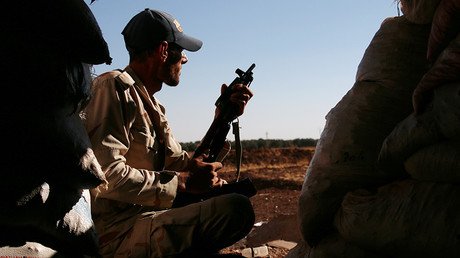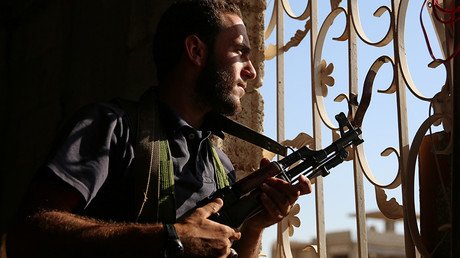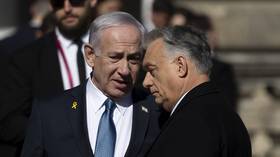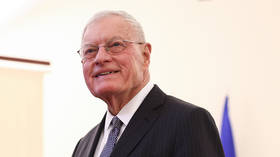US cuts ties to Syrian rebel group over ‘objectives inconsistent with defeating ISIS’
The US-led coalition said it would no longer support the Syrian armed opposition group known as Shuhada al-Qaryatayn, or Shuq, because the group pursued goals other than fighting Islamic State (IS, former ISIS/ISIL).
“The coalition only supports the forces committed to fighting ISIS,” Army Col. Ryan Dillon, spokesman for Combined Joint Task Force Operation Inherent Resolve, told reporters Thursday, adding that “one of the partner forces that [the coalition] was working with” had objectives that “were not consistent with defeating ISIS.”
The colonel identified the group as “Shuhada al-Qaryatayn, commonly referred to as the Shuq” and said that it is stationed in the al-Tanf area in southern Syria. He did not provide any specific details concerning the group’s actions that forced the coalition to cut ties but said that the group “unilaterally, without the US or coalition permission or coordination, conducted patrols outside of the agreed de-escalation zone and engaged in the activities not focused on fighting ISIS.”
Social media reports earlier said that the Shuq militants attacked the forces loyal to the Syrian government north from the al-Tanf area on July 16 and even seized several positions in the region.
S. #Syria: #FSA Shuhada Qaryatayn attacked pro-Assad forces N. of Al-Tanf & reportedly seized several positions. https://t.co/gz4Dwm1yLApic.twitter.com/wW0OdmZZNH
— Qalaat Al Mudiq (@QalaatAlMudiq) 16 июля 2017 г.
Answering questions, Dillon admitted that “fighting the [Assad] regime” could be “one of these objectives” pursued by the group and inconsistent with fighting Islamic State.
He then explained that the coalition had “since talked with them and told them that we cannot support them if they want to pursue an objective other than defeating ISIS” but the group apparently refused to change its priorities as the coalition eventually decided that it will “no longer support their operations.”
The colonel also added that the US-led forces are now “in the process of ceasing our support for them and receiving the equipment that we provided to them for the fight against ISIS.”
However, he also said that “the coalition will support and train and advise and assist and accompany the vetted partner forces that wish to defeat ISIS” despite taking a decision “no longer to support this particular group.”
Shuhada al-Qaryatayn was reportedly one of the Syrian armed opposition groups that were trained and equipped by the US under the CIA special operations program. In May, Buzzfeed News reported that the US Special Forces were deployed to southern Syria as part of an operation to train and assist Syrian rebels, including those from the Shuq.
US troops reportedly participated in operations in the region alongside the Shuq militants, the media outlet said, citing a rebel official who closely worked with the US forces.
Some images and videos posted on social media also showed the Shuq militants training under the supervision of the US instructors.
The announcement Thursday concerning the coalition severing ties with the group comes less than a week after US Army General Raymond Thomas, head of Special Operations Command, confirmed that Washington had decided to put an end to a CIA program that involved equipping and training certain rebel groups fighting the Syrian government.
Syrian rebel groups Jaish Shuhada al-Qaryatayn and Maghaweir al-Thawra training in the Syrian desert with US/Jordanian instructors and M16s. pic.twitter.com/qYkkoPRPRW
— Henry Leconte (@henrylec1) 18 июля 2017 г.
#US commandos have engaged in combat with #ISIS during a secret deployment to southern #Syria
— Mete Sohtaoğlu (@metesohtaoglu) 11 мая 2017 г.
📸 #FSA Shuhada al-Qaryatayn
Via @mike_gigliopic.twitter.com/YIhyJr6ewk
Two US officials, who spoke on condition of anonymity with Reuters earlier, pointed out that the covert CIA tactic had produced little success. The CIA began covertly arming and training the so-called moderate Syrian opposition forces in 2013.
Russia has repeatedly warned against arming the so-called moderate opposition groups in Syria, underlining that weapons supplied to them often fall into the hands of jihadist groups.















